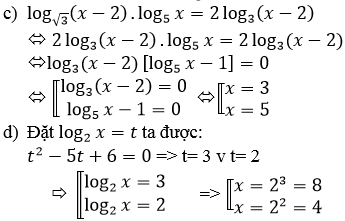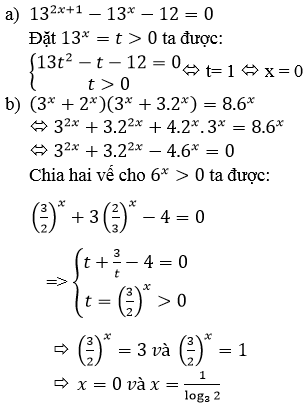Hãy nhập câu hỏi của bạn vào đây, nếu là tài khoản VIP, bạn sẽ được ưu tiên trả lời.


Toàn bộ nghiệm của 3 pt này đều là nghiệm thực, không có nghiệm phức nào
a. \(x^2-3x-2=0\Rightarrow\left[{}\begin{matrix}x=\dfrac{3+\sqrt{17}}{2}\\x=\dfrac{3-\sqrt{17}}{2}\end{matrix}\right.\)
b. \(x^4-5x^2+6=0\Rightarrow\left[{}\begin{matrix}x^2=2\\x^2=3\end{matrix}\right.\) \(\Rightarrow\left[{}\begin{matrix}x=\pm\sqrt{2}\\x=\pm\sqrt{3}\end{matrix}\right.\)
c. \(-x^2+4x+5=0\Rightarrow\left[{}\begin{matrix}x=-1\\x=5\end{matrix}\right.\)


a)
Có:
\(log_2^{\left(2^x+1\right)}.log_2^{\left(2^{x+1}+2\right)}=2\)
\(\Leftrightarrow log_2^{\left(2^x+1\right)}.\left[1+log_2^{\left(2^{x+1}\right)}\right]=2\)
Đặt \(t=log_2^{\left(2^x+1\right)}\), ta có phương trình \(t\left(1+t\right)=2\Leftrightarrow t^2+t-2=0\)
\(\Leftrightarrow\left[{}\begin{matrix}t=1\\t=-2\end{matrix}\right.\Leftrightarrow\left[{}\begin{matrix}log_2^{\left(2^x+1\right)}=1\\log_2^{\left(2x+1\right)}=-2\end{matrix}\right.\)
\(\Leftrightarrow\left[{}\begin{matrix}2^x+1=2\\2^x+1=\dfrac{1}{4}\end{matrix}\right.\Leftrightarrow\left[{}\begin{matrix}2^x=1\\2^x=-\dfrac{3}{4}\left(không-t.m\right)\end{matrix}\right.\Leftrightarrow x=0\)
b)
Với điều kiện \(x>0\), ta có:
\(log.\left(x^{log9}\right)=log9.logx\) và \(log\left(9^{logx}=logx.log9\right)\)
nên \(log\left(x^{log9}\right)=log\left(9^{logx}\right)\)
\(\Rightarrow x^{log9}=9^{logx}\)
Đặt \(t=x^{log9}\), ta được phương trình \(2t=6\Leftrightarrow t=3\Leftrightarrow x^{log9}=3\)
\(\Leftrightarrow log\left(x^{log9}\right)=log3\Leftrightarrow log9.logx=log3\)
\(\Leftrightarrow logx=\dfrac{log3}{log9}\Leftrightarrow x=\dfrac{1}{2}\)
\(\Leftrightarrow x=\sqrt{10}\) (thỏa mãn điều kiện \(x>0\)).
c)
Với điều kiện \(x>0\), lấy lôgarit thập phân hai vế của phương trình đã cho, ta được:
\(\left(3log^3x-\dfrac{2}{3}logx\right).logx=\dfrac{7}{3}\)
Đặt \(t=logx\), ta được phương trình:
\(3t^4-\dfrac{2}{3}t^2-\dfrac{7}{3}=0\)
\(\Leftrightarrow9t^4-2t^2-7=0\Leftrightarrow\left[{}\begin{matrix}t^2=1\\t^2=-\dfrac{7}{9}\left(không-t.m\right)\end{matrix}\right.\Leftrightarrow\left[{}\begin{matrix}t=1\\t=-1\end{matrix}\right.\)
\(\Leftrightarrow\left[{}\begin{matrix}logx=1\\logx=-1\end{matrix}\right.\Leftrightarrow\left[{}\begin{matrix}x=10\\x=\dfrac{1}{10}\end{matrix}\right.\)
d)
Đặt \(t=log_5^{\left(x+2\right)}\) với điều kiện \(x+2>0\), \(x+2\ne1\), ta có:
\(1+\dfrac{2}{t}=t\Leftrightarrow t^2-t-2=0,t\ne0\)
\(\Leftrightarrow\left[{}\begin{matrix}t=-1\\t=2\end{matrix}\right.\Leftrightarrow\left[{}\begin{matrix}log_5^{\left(x+2\right)}=-1\\log_5^{\left(x+2\right)}=2\end{matrix}\right.\Leftrightarrow\left[{}\begin{matrix}x+2=\dfrac{1}{5}\\x+2=25\end{matrix}\right.\Leftrightarrow\left[{}\begin{matrix}x=-\dfrac{9}{5}\\x=23\end{matrix}\right.\)

a) Đặt t = 13x > 0 ta được phương trình:
13t2 – t – 12 = 0 ⇔ (t – 1)(13t + 12) = 0
⇔ t = 1 ⇔ 13x = 1 ⇔ x = 0
b)
Chia cả hai vế phương trình cho 9x ta được phương trình tương đương
(1+(23)x)(1+3.(23)x)=8.(23)x(1+(23)x)(1+3.(23)x)=8.(23)x
Đặt t=(23)xt=(23)x (t > 0) , ta được phương trình:
(1 + t)(1 + 3t) = 8t ⇔ 3t2 – 4t + 1 = 0 ⇔ t∈{13,1}t∈{13,1}
Với t=13t=13 ta được nghiệm x=log2313x=log2313
Với t = 1 ta được nghiệm x = 0
c) Điều kiện: x > 2
Vì nên phương trình đã cho tương đương với:
[log3(x−2)=0log5x=1⇔[x=3x=5[log3(x−2)=0log5x=1⇔[x=3x=5
d) Điều kiện: x > 0
log22x – 5log2x + 6 = 0
⇔(log2x – 2)(log2x – 3) = 0
⇔ x ∈ {4, 8}

a) Bất phương trình đã cho tương đương với hệ sau:


Vậy tập nghiệm là (−1;0) ∪ (7/2; + ∞ )
b) Tương tự câu a), tập nghiệm là (1/10; 5)
c) Đặt t = log 2 x , ta có bất phương trình 2 t 3 + 5 t 2 + t – 2 ≥ 0 hay (t + 2)(2 t 2 + t − 1) ≥ 0 có nghiệm −2 ≤ t ≤ −1 hoặc t ≥ 1/2
Suy ra 1/4 ≤ x ≤ 1/2 hoặc x ≥ 2
Vậy tập nghiệm của bất phương trình đã cho là: [1/4; 1/2] ∪ [ 2 ; + ∞ )
d) Bất phương trình đã cho tương đương với hệ:


Vậy tập nghiệm là (ln(2/3); 0] ∪ [ln2; + ∞ )




Đáp án A